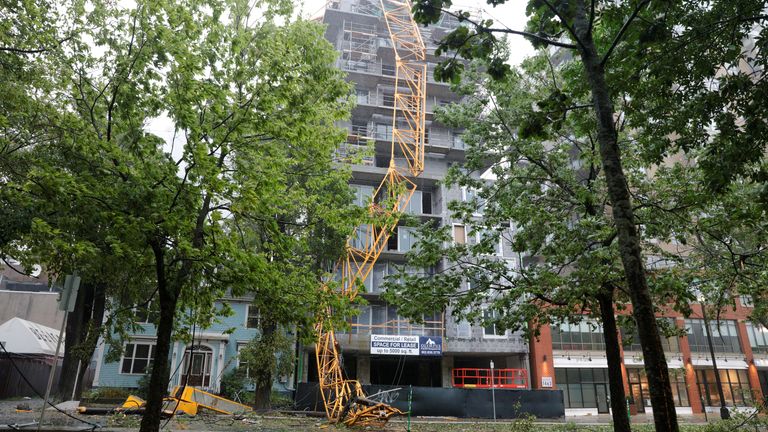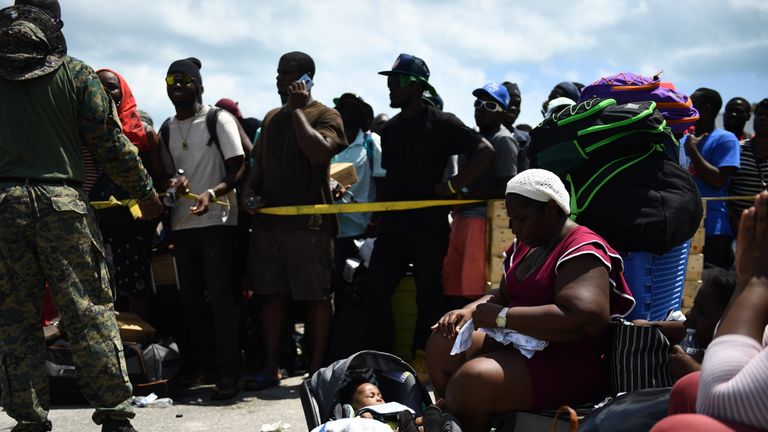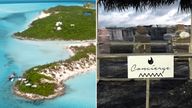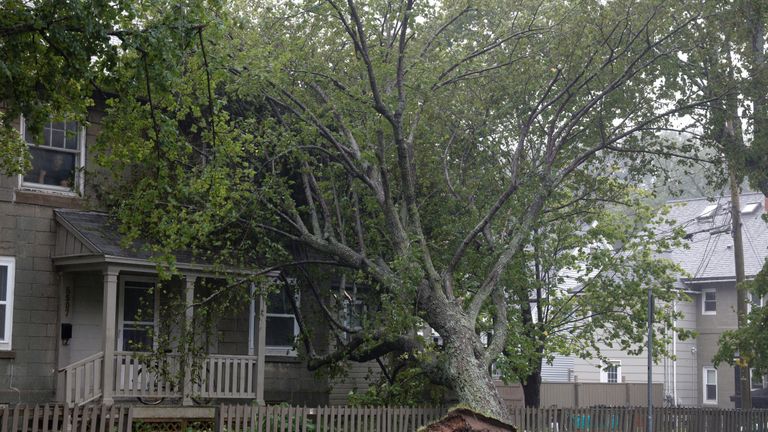Hurricane Dorian: Bahamas in 'hour of darkness' as storm hits Canada
A number of countries are involved in the aid effort as tens of thousands of people remain homeless after Hurricane Dorian.
Sunday 8 September 2019 14:06, UK
The prime minister of the Bahamas has said the islands are in their "hour of darkness" following the onslaught of Hurricane Dorian, which is now wreaking havoc in Canada after moving north up the US east coast.
Conditions have "rapidly" deteriorated in the Caribbean since the tropical cyclone hit earlier this week, leaving tens of thousands of people homeless and damage of around $3bn (£2.4bn) to insured property.
The official number of dead - 43 - is also expected to rise as the situation becomes clearer.
After wreaking havoc in the US state of North Carolina, Dorian arrived on the Atlantic coast of Canada on Saturday, bringing with it heavy rain and powerful winds that have toppled a construction crane in Halifax and knocked out power for hundreds of thousands of people.
Warnings remain in place that heavy items could be swept up and cause damage, with the National Hurricane Centre pinpointing the storm to about 60 miles south of the Magdalen Islands at 3am Sunday (UK time).
It still has maximum sustained winds of 90mph and has forced evacuations in the south Halifax, where a roof was ripped off an apartment building that was under construction.
While it is causing more chaos than expected in the north, the Bahamas certainly bore the brunt.
Dorian was a category five storm when it hit the Bahamas, and was a category two storm by the time it started pounding parts of North Carolina on Friday.
As the Bahamas come to terms with the damage, the country's prime minister Hubert Minnis said: "We acknowledge that there are many missing and that the number of deaths is expected to significantly increase.
"This is one of the stark realities we are facing in this hour of darkness."
The US Coast Guard says it has rescued 290 people in the Bahamas.
Cruise ships have also been helping to deliver supplies, health workers and emergency crews to the islands, and ferrying survivors to the US.
About 1,100 people who had been evacuated by ship arrived in Florida, weary but safe, and aid is arriving from a number of countries - including Britain, which has sent Royal Navy medics and pledged £1.5m in aid.
The Royal Navy has so far provided emergency shelter and hygiene kits for hundreds of people, more than 8,000 bottles of water and hundreds of days worth of food.
Herve Verhoosel, spokesman for the UN world food programme, said the needs "remain enormous".
He added: "Evacuations are slowly taking place by ferry, as hundreds of residents reportedly flee daily."
Red Cross spokeswoman Jennifer Eli said: "Our relief operation is growing, but we are also facing serious challenges in terms of delivering aid.
"Even search-and-rescue choppers haven't been able to reach some people because there's no place to land. These challenges are affecting everyone."
In North Carolina, there were no reports of serious injury there but about 200 people are in shelters and almost 60,000 homes without electricity.










